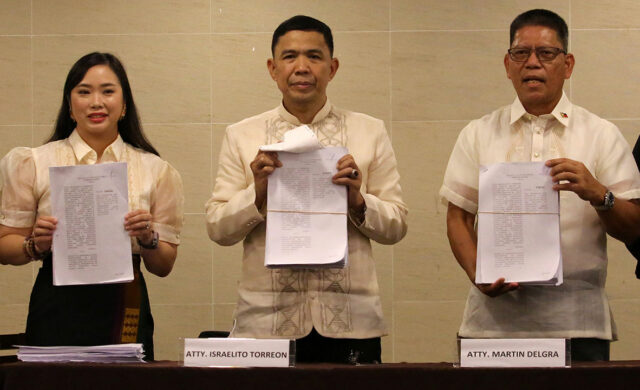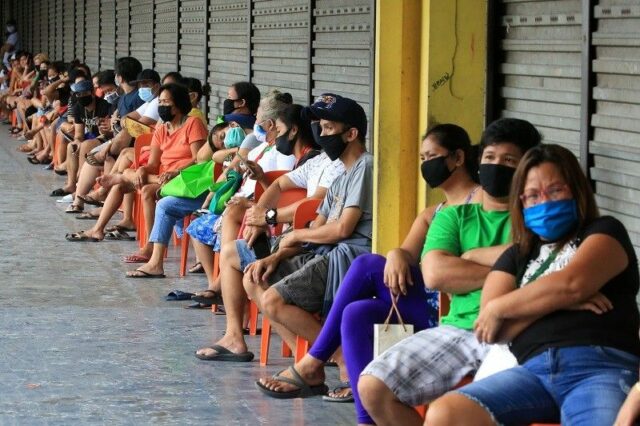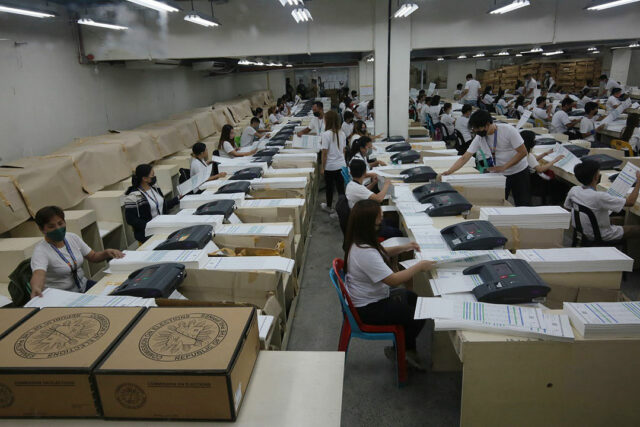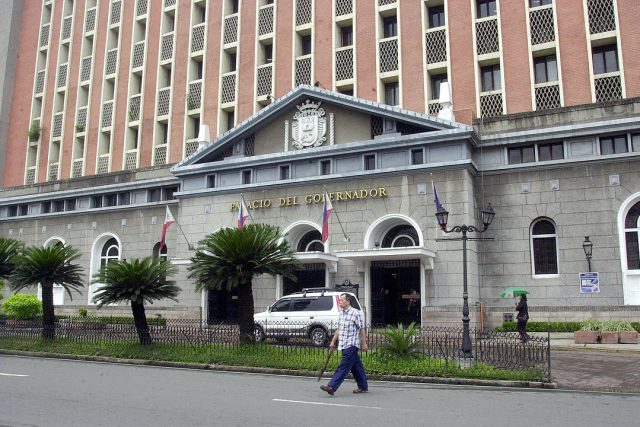Peso weakens with Fed seen extending pause
THE PESO declined against the dollar on Tuesday as some US Federal Reserve policy makers said they may need to keep rates steady for now due to elevated inflation.
The local unit closed at P58.15 versus the greenback on Tuesday, weakening by 12 centavos from its P58.03 finish on Monday, Bankers Association of the Philippines data showed.
The peso opened Tuesday’s trading session weaker at P58.08 against the dollar, which was already its intraday best. Meanwhile, it dropped to as low as P58.285 versus the greenback.
Dollars exchanged rose to $1.67 billion on Tuesday from $1.16 billion on Monday.
The peso depreciated on broad dollar strength following hawkish comments from Fed officials, a trader said in a phone interview.
For Wednesday, the trader expects the peso to move between P58 and P58.40 per dollar, while Rizal Commercial Banking Corp. Chief Economist Michael L. Ricafort sees it ranging from P58.05 to P58.25.
The dollar firmed on Tuesday as traders weighed tariff worries and the path to US rate cuts, Reuters reported.
Investor focus this week will be on Wednesday’s release of minutes of the Federal Reserve’s meeting in January to gauge how policy makers have sought to weigh the risk of a broader tariff war in the wake of President Donald J. Trump’s trade policies.
Data last week showed US consumer prices increased at the fastest pace in nearly 18 months in January, reinforcing the Fed’s message that it was in no rush to resume cutting rates amid growing economic worries.
The dollar index, which measures the greenback against six other major currencies, was 0.27% higher at 107.01, still not far from the two-month low of 106.56 it touched on Friday.
Federal Reserve Governor Michelle Bowman said on Monday she wanted increased conviction that inflation will decline further this year before lowering interest rates again, particularly given uncertainty around the impact of the Trump administration’s new trade and other policies, Reuters reported.
Meanwhile, Federal Reserve Bank of Philadelphia President Patrick Harker sounded an upbeat note on the state of the US economy on Monday, and said he saw no reason to change interest rate policy right now as the central bank continued to work to lower inflation levels.
For his part, Federal Reserve Governor Christopher Waller said his “baseline” view is that the Trump administration’s new tariffs will have only a modest impact on prices that the central bank should try to look through in setting monetary policy.
As it stands “the data are not supporting a reduction in the policy rate,” Mr. Waller said. “But if 2025 plays out like 2024, rate cuts would be appropriate at some point this year.”
The Fed at its March meeting is expected to hold its benchmark interest rate steady at the current range of 4.25% to 4.5%. — A.M.C. Sy with Reuters
PSEi advances as strong earnings boost sentiment
PHILIPPINE STOCKS recovered on Tuesday as strong corporate earnings lifted sentiment and as players picked up bargains following the market’s two-day decline.
The benchmark Philippine Stock Exchange index (PSEi) rose by 1.69% or 101.48 points to close at 6,094.96, while the broader all shares index climbed by 1.87% or 67.78 points to end at 3,678.94.
The PSEi opened Tuesday’s session at 5,994.64, a tad higher than Monday’s finish and already its intraday low. It climbed to as high as 6,107.62 during the day but settled just below the 6,100 mark at the closing bell.
“The local market bounced back this Tuesday as investors hunted for bargains after two consecutive days of decline. Optimism towards fourth quarter and full-year 2024 corporate results also helped in driving the market higher following sound earnings reports from Bank of the Philippine Islands, Asia United Bank Corp., and the most recent one SM Prime Holdings, Inc.,” Philstocks Financial, Inc. Senior Research Analyst Japhet Louis O. Tantiangco said in a Viber message.
“Also helping in Tuesday’s trading was the overseas Filipinos’ cash remittance data for 2024, which posted a 3% increase,” he added.
Cash remittances from overseas Filipino workers hit an all-time high of $34.49 billion in 2024, up by 3% year on year and in line with the central bank’s full-year forecast.
“Philippine shares closed higher as investors welcomed the signing of the IRR (implementing rules and regulations) for corporate tax cuts,” Regina Capital Development Corp. Head of Sales Luis A. Limlingan said in a Viber message.
On Monday, Finance Secretary Ralph G. Recto and Trade Secretary Ma. Cristina Aldeguer-Roque signed the IRR of the Corporate Recovery and Tax Incentives for Enterprises to Maximize Opportunities for Reinvigorating the Economy or CREATE MORE Act.
Almost all sectoral indices closed higher on Tuesday. Property surged by 3.32% or 71.23 points to 2,216.68; financials climbed by 1.52% or 34.38 points to 2,283.92; holding firms increased by 1.36% or 68.35 points to 5,076.79; industrials jumped by 1.34% or 116 points to 8,753.40; and services rose by 0.36% or 7.23 points to 1,992.82.
Meanwhile, mining and oil dropped by 0.17% or 13.89 points to 7,939.94.
“ACEN Corp. was the day’s index leader, jumping 5.26% to P3.20. Emperador, Inc. was the main index laggard, falling 2.99% to P12.32,” Mr. Tantiangco said.
Value turnover increased to P6.30 billion on Tuesday with 1.06 billion shares traded from the P5.32 billion with 1.23 billion issues that changed hands on Monday.
Advancers bested advancers, 101 versus 72, while 64 names were unchanged.
Net foreign selling declined to P199.76 million on Tuesday from P991.98 million on Monday. — R.M.D. Ochave
Philippines accuses Chinese Navy of reckless flight maneuvers near shoal
By John Victor D. Ordoñez and Adrian H. Halili, Reporters
THE Philippine Coast Guard accused the Chinese Navy of performing dangerous flight maneuvers on Tuesday when it flew close to a government aircraft patrolling a disputed shoal in the South China Sea.
“This reckless action posed a serious risk to the safety of the pilots and passengers,” it said in a statement.
The Philippine Coast Guard said the government fishery aircraft was conducting what it called a maritime domain awareness flight over Scarborough Shoal, a rocky atoll and prime fishing patch inside the Philippines’ exclusive economic zone.
The People’s Liberation Army Navy helicopter flew as close as three meters to the aircraft, which the Philippine Coast Guard said was a “clear violation and blatant disregard” of aviation regulations.
The Philippine plane “intruded” into China’s airspace over the disputed shoal, the Southern Theater Command of China’s military said in a statement.
The move by the Philippines severely “violated” China’s sovereignty, it said, adding that the Chinese military had organized naval and air forces to track, monitor and drive away the plane.
The Chinese Embassy in Manila, quoting Colonel Tian Junli, a spokesman for the Southern Theater Command, said the Philippine government had “reversed right and wrong and spread false narratives.”
“The Philippine actions seriously violated China’s sovereignty and seriously violated relevant provisions of international law and Chinese laws. Huangyan Island (Scarborough Shoal) is China’s inherent territory,” it added.
“The Theater troops remain on high alert and will resolutely defend national sovereignty and security and peace and stability in the South China Sea.”
Named after a British ship that was grounded on the atoll nearly three centuries ago, Scarborough Shoal is one of the most contested maritime feature in the South China Sea, where Beijing and Manila have clashed repeatedly.
“The People’s Liberation Army Navy offensive action seen in their reckless helicopter flight maneuvers over the West Philippine Sea is an unfair fortification of their air power in our air space,” Chester B. Cabalza, founding president of Manila-based think tank International Development and Security Cooperation, said in a Facebook Messenger chat.
“Our rules should be recognized and respected in our own air space. China’s low-flying light combat aircraft has no right to risk the safety of our Filipino coast guardians by sheer intimidation,” he added.
“There seems to be no foreseeable off-ramp, so it is important to have a working hotline and crisis management mechanism to avoid serious accidents or miscalculation,” Lucio B. Pitlo III, a research fellow at the Asia-Pacific Pathways to Progress Foundation, said via Messenger chat.
“Worryingly, dangerously close run-ins are becoming a new norm in the maritime spat between the Philippines and China,” he added.
China claims sovereignty over almost the entire South China Sea, a vital waterway for more than $3 trillion of annual ship-borne commerce, putting it at odds with Brunei, Indonesia, Malaysia, the Philippines and Vietnam.
A United Nations-backed tribunal in 2016 voided China’s claim for being illegal, but Beijing does not recognize the ruling.
“Unless the two parties come to terms to settle their differences on the use of waters and air space in the South China Sea, such incident can occur again,” Rommel C. Banlaoi, president of the Philippine Society for International Security Studies and former deputy national security adviser, said in a Viber message.
“Both parties need to learn how to coordinate their actions in the South China Sea if they want to prevent unintended violent encounters at sea,” he added. — with Reuters
SC asked to stop Senate from trying VP Duterte

By Chloe Mari A. Hufana and Adrian H. Halili, Reporters
SUPPORTERS OF Vice-President (VP) Sara Duterte-Carpio on Tuesday asked the Supreme Court (SC) to stop the Senate from holding her impeachment trial, as they accused the House of Representatives of violating her right to due process during impeachment proceedings.
Twenty-nine plaintiffs led by Davao-based lawyer Israelito P. Torreon and former Land Transportation Franchising and Regulatory Board Chairman Martin B. Delgra III filed the lawsuit. More are expected to join as intervenors in the case.
Named respondents were the Senate and House.
In 114-page pleading, the plaintiffs also asked the High Court to void the articles of impeachment against Ms. Duterte for failing to meet constitutional requirements on verification and proper filing.
“This is a legitimate attempt on the part of the people to stop a constantly void, as well as defective, procedurally defective, and jurisdictionally deficient impeachment complaint that was filed against Vice-President Sara Duterte,” Mr. Torreon separately told reporters after filing the suit.
He said they had not been influenced by the Vice-President to file the case.
Civil society groups, activists and clergymen separately filed three impeachment complaints against the Vice-president in December. More than 215 congressmen filed and endorsed a fourth complaint that was directly sent to the Senate before Congress went on a four-month break early this month.
Mr. Torreon said congressmen violated Ms. Duterte’s right to due process by railroading the impeachment proceedings.
“The VP was not even summoned to answer the allegations that she committed as found in the complaint,” he said. “There was no due process at all.”
He also said the impeachment complaint sent to the Senate bore only the signature of House Secretary General Reginald S. Velasco.
Meanwhile, Supreme Court spokesperson Camille Sue Mae L. Ting said the High Court gave the Senate 10 days to comment on a separate lawsuit asking the court to compel senators to start Ms. Duterte’s impeachment trial.
The tribunal might soon ask the Senate to comment on the Torreon lawsuit, she told a news briefing, noting that it would treat the case with urgency.
“In general, the Supreme Court is tasked to determine if the impeachment proceedings or the impeachment rules are in accordance with the Constitution and if there’s any grave abuse of discretion on the part of the Senate,” Ms. Ting said.
The High Court has the power to determine any abuse of discretion by any government branch, she added.
The House impeached Ms. Duterte on Feb. 5, accusing her of misusing confidential funds.
Senate President Francis G. Escudero earlier said they would not be able to convene as an impeachment court until July since Congress is on a recess.
Also on Tuesday, Senate Minority Leader Aquilino L. Pimentel III urged the Senate president to start the impeachment proceedings.
In a letter, he said the 1987 Constitution mandates the Senate to promptly start any impeachment trial.
“Given the gravity of impeachment proceedings, it is imperative that the Senate uphold its duty with urgency, diligence and a steadfast commitment to the Constitution,” according to a copy of the letter dated Feb. 14.
He said the term “forthwith” used by the Charter means the Senate should not delay the impeachment proceedings. “I repeat that this is the Senate’s duty.”
Senator Ana Theresia N. Hontiveros-Baraquel said that Constitution clearly states that the impeachment trial of the Vice-President should start immediately. “I agree with the letter issued by (Mr. Pimentel),” she told reporters in a Viber group message.
At a news briefing, Senator Maria Imelda R. Marcos said the term “forthwith” still depends on the Senate’s next available session.
“In fact, we’ve been hearing about impeachment in Congress for two years now,” the lawmaker, an ally of Ms. Duterte, said. “Also, the final impeachment complaint was not immediately brought to the Senate. We can’t say it is urgent and requires the calling of a special session.”
Congress went on a four-month break starting Feb. 5 for the 2025 midterm elections. It will reconvene for a two-week session on June 2.
The House impeached Ms. Duterte on charges of violating the Constitution, betrayal of public trust, graft and corruption and other high crimes.
The ouster charges consisted of seven articles of impeachment, including allegations of plotting the assassination of the President, misusing secret funds, amassing unexplained wealth and committing acts of destabilization.
Marcos orders DSWD to fast-track aid in calamity areas
PRESIDENT Ferdinand R. Marcos, Jr. on Tuesday ordered the Department of Social Welfare and Development (DSWD) to boost efforts to digitalize its services to speed up and expand its aid programs especially in areas prone to natural calamities.
“We must also prepare for the future,” he said in a speech at the DSWD’s seventh anniversary program in Manila, based on a transcript from the Presidential Communications Office. “That future demands modernization, efficiency and accessibility.”
“Even as we strengthen these core programs, we remain vigilant against modern challenges such as climate change.”
On Tuesday, the DSWD launched an online portal where people can send cash donations electronically.
It also launched a so-called harmonized electronic license and permit system that seeks to fast-track applications for licenses and permits and make it easier for stakeholders to access assistance programs.
“This online system will allow our clients to access our regulatory services anytime, anywhere as long as they have their gadgets and internet access with them, even in the comfort of their homes,” Social Welfare spokesperson Irene B. Dumlao said in a statement.
The agency is tasked to regulate the certification and accreditation of social welfare and development agencies and other civil society groups engaged in social work.
Ms. Dumlao said the new system will cut the processing of permits to seven days from 43.
The Social Welfare department also launched the minors traveling abroad system, a more streamlined travel clearance process for children.
Mr. Marcos cited the need for the DSWD to continue aid programs for Filipinos during climate disasters, such as the quick-response fund that helped almost 7.4 million Filipino families affected by calamities last year.
The President also backed the implementation of the agency’s conditional cash transfer program, which benefitted about 4 million Filipinos last year.
The fund includes rice and health subsidies worth P600 and P750 a month. It also covers monthly school subsidies worth P300-P700 for more than 7 million students.
“Through conditional cash grants, we help families stay on track with their children’s education and their healthcare, laying a sturdier foundation for a better life,” Mr. Marcos said.
“Every single centavo spent, every program that is implemented, every decision that has been made must serve a very clear purpose: to create opportunities that endure, uplift and reach far beyond just today,” he added. — John Victor D. Ordoñez
Franchise requirement for social media mulled amid disinformation crackdown

By Kenneth Christiane L. Basilio, Reporter
A HOUSE of Representatives committee is considering a proposal that will require social media companies to secure a franchise to operate as part of efforts to combat the spread of disinformation, a congressman said on Tuesday.
An operational franchise could also allow the government to capture the industry’s profits amid tax jurisdiction issues faced by the Bureau of Internal Revenue (BIR) in collecting taxes from online personalities, Surigao del Norte Rep. Robert Ace S. Barbers said during a House probe into online disinformation.
“We are contemplating on… asking all social media platforms to secure a franchise in Congress,” he said.
“We want to make sure that it’s not just the platforms who make money, but also the Philippine government. If you are under the franchise of this government, then you will be subject to the regulations and rules that will be imposed,” he added.
BIR lawyer Tobias Gavin C. Arcilla told the panel that the revenue commission relies on the “voluntary declaration” of online personalities for their income taxes.
“There is great difficulty in monitoring it considering that their income primarily comes from foreign income payor,” he said.
“What we do is we audit and investigate the influencers, and we request data from foreign tax jurisdictions where we have existing treaties of exchange of information with, and we cross-check or we compare the information that we receive… and their (online personalities’) declared income tax returns.”
At present, the Philippine government requires public utilities, such as power distributors and water concessionaires, as well as broadcasting companies to secure a legislative franchise from Congress before operating.
“There needs to be regulation. There should be a policy for our social media platforms and actors because they shouldn’t be allowed to use it to spread fake news or baseless statements,” said Mr. Barbers in Filipino.
He said the House joint committee on public safety, public information and communications technology would likely determine key factors for franchise approval after its investigation.
“This is not intended to suppress their freedom of expression or their free speech. This is to ensure discipline, a code of conduct, and ethics [in platforms],” he added.
The proposal giving Congress the power to grant social media platforms a franchise to operate could stifle free speech and be weaponized, according to analysts.
“A legislative franchise requirement for social media platforms raises serious concerns. While it aims to curb mis- and disinformation, it risks state overreach, censorship, and politicization of digital spaces,” Karl Patrick R. Mendoza, an associate professor at the Polytechnic ya University of the Philippines’ Department of Communication Research, said in a Facebook Messenger chat.
“This will not effectively reduce disinformation. Misinformation thrives due to algorithmic incentives, political networks, and low media literacy, not just weak regulation,” he added.
The government should instead push greater accountability for social media platforms through fact-checking collaborations and digital literacy programs, said Mr. Mendoza.
The proposal to police social media platforms through a legislative franchise requirement is “unacceptable,” Danilo A. Arao, an associate professor of journalism at the University of the Philippines, said in a Facebook Messenger chat.
“Legislative franchises can be weaponized, as in the case of what happened to ABS-CBN in 2020. There are no benefits when media operations are put at the legislators’ mercy,” he said.
“If Congress wants to fight ‘fake news,’ it should allocate a bigger education budget so that schools can do a better job in implementing media literacy and media education,” he added.
AMONG BIGGEST CHALLENGES
Most Filipinos source news from these platforms, with six out of 10 Filipinos saying they get their news from social media, particularly on Facebook, a 2024 survey by political consultancy firm Publicus Asia reported. In a separate report, the University of the Philippines found that the widespread use of social media inundates Filipinos with content spreading mis- and disinformation.
Also on Tuesday, Philippine Coast Guard spokesman Jay Tristan Tarriela said that “fake news” is among the biggest challenges of the Philippine government in Manila’s campaign to stake its South China Sea claim.
The Chinese Embassy in the Philippines did not immediately respond to a Viber message seeking comment.
The Philippine government launched its “transparency” campaign in the South China Sea to “raise awareness among the Filipino people about the realities in the West Philippine Sea,” said Mr. Tarriela, referring to areas of the waterway that falls within Manila’s exclusive economic zone.
SC sets budget hearing for April
THE SUPREME COURT (SC) scheduled oral arguments for cases questioning the legality of the 2025 General Appropriations Act (GAA) and the Maharlika Investment Fund Act in April.
Spokesperson Camille Sue Mae L. Ting on Tuesday said the court en banc had scheduled oral arguments for the petition filed by former Presidential Spokesman Victor D. Rodriguez and others, questioning the legality of the 2025 GAA on April 1, at 2 p.m. at the En Banc Session Hall, SC Baguio Compound, Baguio City.
A preliminary conference has also been scheduled for Feb. 28, at 1 p.m. at the En Banc Session Hall, SC Main Building, Manila.
Mr. Rodriguez and his cohorts argued the GAA violated the Constitution by failing to allocate mandatory funding for the Philippine Health Insurance Corp. (PhilHealth), unlawfully increasing appropriations beyond the President’s recommendations, and prioritizing infrastructure spending over education.
They also claim it is illegal due to blank items in the Bicameral Committee Report on the General Appropriations Bill.
Meanwhile, the high tribunal, in its en banc session last Jan. 28, also scheduled oral arguments on the petition filed by Senator Aquilino L. Pimentel III, Bayan Muna Chairman Neri J. Colmenares, and others that challenged the validity of the Maharlika Investment Fund Act of 2023.
Ms. Ting said the high court scheduled the oral arguments for the case on April 22, at 2 p.m. at the En Banc Session Hall, SC Baguio Compound, Baguio City.
While the preliminary conference is scheduled for Feb. 26, at 2 p.m. at the En Banc Session Hall, SC Main Building, Manila City.
The named respondents were the Bangko Sentral ng Pilipinas, Land Bank of the Philippines and Development Bank of the Philippines.
The high court ordered them to file their respective comments within a non-extendible period of 10 days from notice. — Chloe Mari A. Hufana
Digital infra, AI upskilling pushed
A GROUP of private sector leaders advising President Ferdinand R. Marcos, Jr. on economic concerns has pushed for the upgrade of digital infrastructure in far-flung areas and for more artificial intelligence (AI) upskilling programs to ensure Filipinos have reliable internet services and are able to keep up with new tech.
“The President’s direct engagement in refining policies into practical solutions underscores the urgent need to expand bandwidth for students and families in remote areas while keeping pace with artificial advancements.” Myla Crespo-Villanueva, who heads the Private Sector Advisory Council’s (PSAC) digital infrastructure section and MDI Group Holdings, Inc, chairperson, said in a statement on Tuesday.
PSAC met with the President in Malacañang on Feb. 14 to discuss state efforts to improve rural digital infrastructure this year, the council said in the same statement.
The council said it proposed rolling out a subsidized subscriber identity module (SIM) card program for poor Filipinos to ensure they can access phone services and internet connectivity.
Through the so-called JuanSim ng Bayan program, the council aims to deploy these cards to 510 areas by the end of the year.
It said the Department of Education (DepEd) will be overseeing the program with the help of the Department of Science and Technology’s (DoST) existing rural telecommunications system to support the subsidized SIM card program.
Under this year’s P6.326-trillion national budget, the Department of Information and Communications Technology has earmarked P7.5 billion to roll out its free public wireless internet access program for far-flung areas this year and to ensure schools can conduct hybrid-learning setups.
A 2022 report by the World Bank showed that only 33% of Philippine households have access to fixed broadband, while 70% of the population have an active mobile broadband subscription.
The cost of broadband internet remains higher in the Philippines than in neighboring countries, with the annual charge for fixed broadband equivalent to 11% of per capita gross national income.
PSAC also called on the government to continue investing in AI infrastructure innovation, and skills development for the workforce.
DICT Secretary Ivan John E. Uy earlier said that the government is prioritizing a bill that seeks to boost Philippine cybersecurity Manila beefs up its defenses from hackers before midterm elections in May.
In 2022, the Philippines only had about 200 cybersecurity professionals compared with 2,000 in Singapore, Mr. Uy earlier said, noting that 80% of Filipino cyber experts work overseas.
The DICT chief has said the government is finding it hard to attract more cybersecurity experts due to lower pay at about P50,000 a month, compared with about P200,000 in the private sector. — John Victor D. Ordoñez
47% of required ballots printed
THE Commission on Elections (Comelec) had already printed 47.48% of ballots for the midterm elections on May 12, it reported on Tuesday.
In a Viber chat with reporters, Chairman George Erwin M. Garcia said 34.2 million ballots had already been printed as of Feb. 18.
This is a product of two National Printing Office printers, which produced a total of 1.67 million ballots on Feb. 17 alone.
 Over 37 million is still yet to be printed, he noted.
Over 37 million is still yet to be printed, he noted.
The poll body aims to finish all ballot printing by mid-March, its chief earlier said.
The campaign period for senatorial and party-list candidates started on Feb. 11, while local bets will start their campaign on March 28.
Up for grabs in the May 12 elections are 317 congressional seats and thousands of local posts. The biggest battle will be for 12 spots in the 24-seat Senate, a chamber packed with political heavyweights and wielding outsized influence. — Chloe Mari A. Hufana
Comelec response to FOI case sought
THE Supreme Court (SC) on Tuesday ordered the Commission on Elections (Comelec) and its partner for the 2025 midterm election, Miru Systems Co., Ltd. (Miru) and others, to comment on a petition requesting information.
In a news briefing in Manila City, Spokesperson Camille Sue Mae L. Ting said the high court en banc required Comelec and Miru joint venture to comment on the petition filed by the Right to Know Right Now Coalition.
The joint venture is made up of Miru, Integrated Computer Systems, St. Timothy Construction Corporation (STCC) and Centerpoint Solutions Technologies, Inc. (Miru joint venture).
 The plaintiffs urged the high court to direct Comelec and the joint venture to respond to their Freedom of Information (FOI) request, citing the public’s constitutional right to access information on matters of public interest.
The plaintiffs urged the high court to direct Comelec and the joint venture to respond to their Freedom of Information (FOI) request, citing the public’s constitutional right to access information on matters of public interest.
They are also requesting the high tribunal to establish rules to address procedural gaps in enforcing this right under the Constitution.
Comelec and the Miru joint venture signed an P18-billion contract to implement the automated election system for the 2025 national and local elections.
However, STCC later withdrew from the consortium, prompting the petitioners to seek information from Comelec and the joint venture regarding their continued compliance with the contract’s legal, financial, technical, and operational requirements.
“We will comply accordingly. On the part of Comelec, we provided them everything that they requested per our policy of complete transparency. We have records to prove that and certainly, include these in our Comment,” Comelec Chairman George Erwin M. Garcia told reporters in a Viber chat. — Chloe Mari A. Hufana
DHSUD, Heart center to build 14 housing projects
THE Department of Human Settlements and Urban Development (DHSUD) has partnered with the Philippine Heart Center (PHC) to build 14 vertical housing projects in Quezon City.
The partnership aims to build a total of 14 buildings with about 3,360 units to address the housing needs of PHC employees and families, the DHSUD said in a statement posted on its Facebook page.
“DHSUD Undersecretary Garry V. De Guzman, representing Secretary Jose Rizalino Acuzar, signed a memorandum of understanding with PHC Executive Director Avenilo Aventura, Jr. for a planned housing project in Barangay Tumana, Marikina City under President Ferdinand R. Marcos, Jr.’s Pambansang Pabahay para sa Pilipino or 4PH Program, Feb. 13,” it said.
The 8.1-hectare community will be located in Barangay Tumana, Marikina City, DHSUD said.
Initial features of the project include a clubhouse, basketball court, pool area, wide open spaces and a commercial building inside the 8.1-hectare community.
The project forms part of the government’s 4PH Program, which seeks to address the country’s housing backlog.
The Marcos administration initially set an ambitious goal of constructing six million housing units by 2028 but has since been reduced to 3.2 million units.
The Philippines’ housing need is projected to jump to 22 million by 2040, according to a report by the United Nations Human Settlements Programme. — Beatriz Marie D. Cruz












